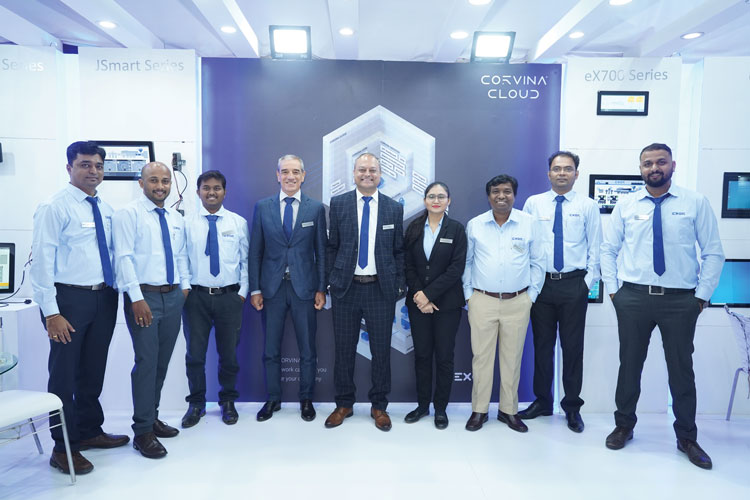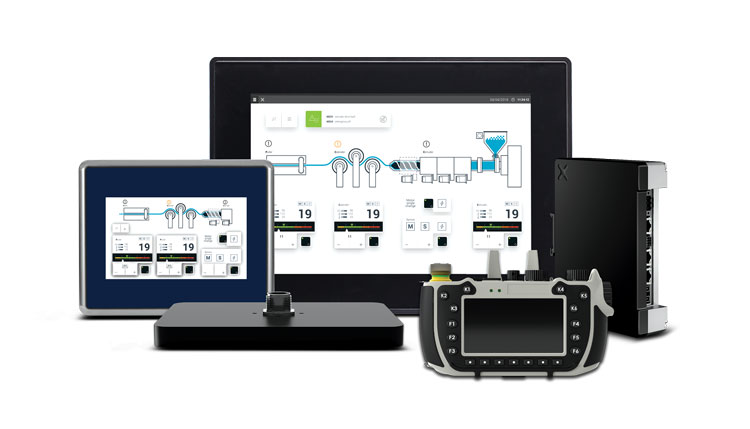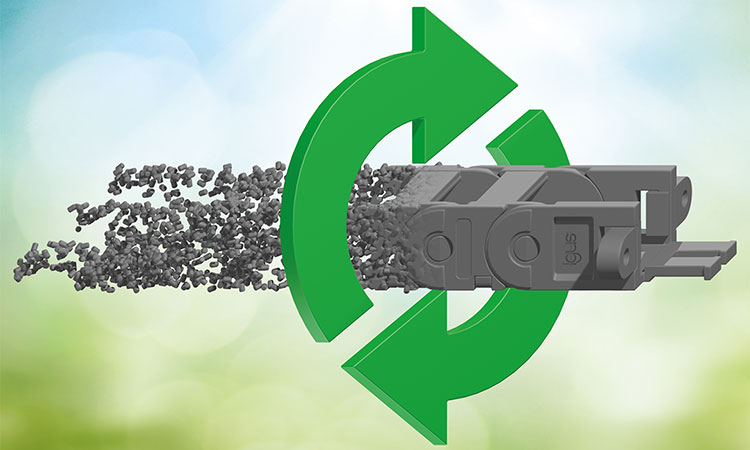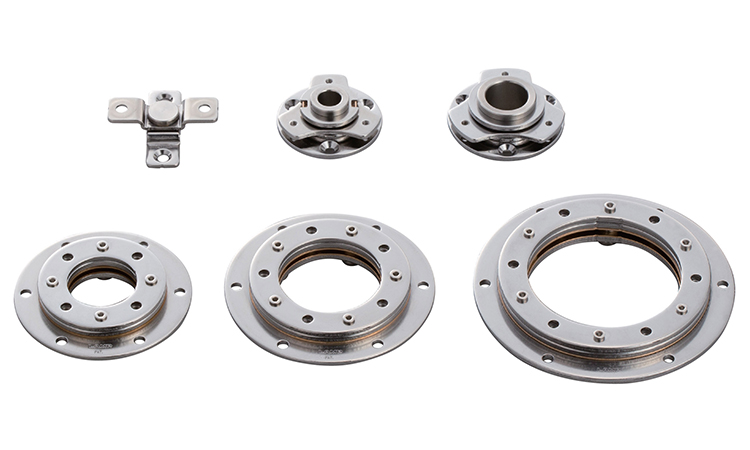80% lower CO2 footprint: igus switches to recycled…

EXOR excels in offering Industry 4.0 technology solutions | ENGINEERING REVIEW |Manufacturing | Industrial Sector Magazine & Portal
Exor is a global manufacturer of HMI & HMI with Control solutions focused on enhancing the user experience. Growth journey for Exor India has just begun with achievement of over 100% growth during the last two years and the company is striving to achieve a lot of similar milestones in the near future. The company’s vision for next five years is to be among the top 5 HMI players with superior technology products in the Indian market and it is also looking forward to starting local manufacturing soon to fuel that growth, discovers Engineering Review in an interaction with Exor India. Excerpts:
Q. Please give an overview of Exor and its activities and offerings.
Exor is a Global Manufacturer of HMI & HMI with Control solutions focused on enhancing the user experience. Exor International S.p.A. offers the world’s largest family of HMI solutions for factory, building, marine automation, and harsh environments to meet your application and budget requirements. Founded in 1971, and developing HMI since 1990, Exor has been making significant advances in the world of HMI programming software and hardware, producing high quality, innovative, and visually appealing Human Machine Interface solutions.
Exor’s 50+ years of experience have led us to our flagship offering, JMobile Configuration Software, eSMART Series, eX700 IIoT Controller. JMobile, alongside our 4+ decades of manufacturing excellence, offers industries’ finest flexibility, connectivity, and portability; Web & Network enabled HMI solutions for secure control & data, anywhere, from any device. Exor’s modern tool set allows for crafting a more visually appealing, better User Experience. A true partner solution wrapped in Exor engineering and support services with the confidence of a 5-year Warranty on the eX series.
We as a Exor India are selling total HMI solutions in the Indian market since 2003 and we are based in Vashi-Navi Mumbai. Exor India, prides itself in being able to serve its customers throughout India with committed delivery schedules backed by powerful local, skilled and efficient technical support services.
Q. What’s your SOM technology all about?
EXOR Embedded concentrates in Embedded Computer Systems based on ARM architecture which are used in many different professional environments. As one of the most innovative suppliers in the field, we offer our customers knowhow and expertise in the areas of: electronic system development with BSP, Linux, Yocto and Codesys, system integration with support for protocol integration and cloud connectivity, and the production of final almost-finished electronic products.
This is where the X Platform by EXOR begins
The EXOR Embedded SOM series offers great performance, space and cost saving array of products.
The SOM catalog is constantly expanded & updated with new versions based on the latest ARM, x86 and FPGA processors to guarantee our customers the possibility of creating competitive and performing product. High computing power and economy of space are the special features of the design. They offer the possibility to place them in compact devices.
EXOR Embedded also offers its customers open-frame or semi-assembled carrier boards such as the new OpenHMI kits. These consist of a single board computer based on nanoSOM connected to a display and touch.
OpenHMI technologies guarantee the best time to market for our customers who can integrate our HW directly into their product.

Q. How are embedded solutions helping in Industry 4.0 implementation?
Powering some of the most innovative and robust products and ecosystems in the Industrial, Marine and Building IoT sector, the Exor nanoSOM and microSOM are the basic components of the IIoT Industry 4.0 ready, X Platform.
The systems on mobile are highly miniaturized, flexible and fully customizable. Most importantly they come with guarantee of a minimum 10-year product life cycle therefore allowing the execution of a viable business case.
Use Exor Embedded microSOM and display options to design your IIoT product yourselves, have Exor design, develop and test your product or simply choose to customize an already existing standard Exor product. The point is, with Exor you do actually have this level of choice, which we will help you make. Nothing is standing in your way to come to market with your IIoT product.
Q. How do you help smart factories through digitalization?
The application of digital technology, which consists of hardware and software solutions within the industrial sector, is currently supporting the digital transformation initiatives within the said sector. These digital technologies include data-capturing tools such as edge computing and IoT solutions, data transfer and storage tools which include industrial cloud platforms, and data-analytics tools such as simulation modeling and digital-twin solutions.
Working with Intel, Telecom Italia (TIM), and JMA Wireless, EXOR has built an end-to-end smart factory that showcases the benefits of Industry 4.0 digitalization to manufacturers of all sizes. The factory uses open, industry-standard platforms and technologies. Co-located at the factory is a joint 5G Lab where manufacturing engineers can experiment and evaluate specific use cases.
Q. Tell us a little bit about your CORVINA Cloud software.
CORVINA offers Servitization and Digitalization solutions through the CORVINA IoT Digital Platform. Digitization applications are solutions based on mathematical models that help companies optimize their production processes, consolidate and take advantage of new business opportunities. Thanks to a consolidated data collection platform, whether from application or production systems, we enable advanced machine learning and artificial intelligence engines to allow companies to see further, innovate and be faster. Through the power of data and people we realize new possibilities, generating value from existing opportunities, while creating innovation and re-imagining processes and systems. We develop breakthrough solutions, with an agnostic vision, thus applicable in any context. CORVINA designs edge devices specific to every sector. Thus, providing you with a complete technological and service stack to achieve your objectives.

Q. What are the latest advances in wireless technology?
The hallmark of communication and the inter-exchange of data remains in wireless technology. First, the introduction of wireless technology and its corresponding iterations – 2G, 3G, and 4G – eliminated the need for wired communication networks within offices and the domestic space. Now, the introduction of the latest iteration is expected to successfully replace wired networks within the harsh environment of the industrial sector in which communication failure can affect productivity.
As upgrades go, 5G has provided the industrial sector with a long-awaited transformative tool to execute the smart facility applications that have been on hold for quite some time. Today, every stakeholder within the industrial sector, with emphasis on the manufacturing industry, understands that 5G introduces enhanced communication speed within the shop floor. What a majority of stakeholders overlook is the reliability the modular approach associated with installing 5G brings to the table.
Leveraging 5G, the industrial sector can scale up its networking requirements at will to meet specific application requirements. An example is scaling up a facility’s IoT framework with tens of new smart devices. Adding these new devices to existing networks requires the addition of new wires for wired connections or configuring them into 4G wireless networks. For wired connectivity, the cost of adding tens of devices is a costly initiative; for 4G, reliability issues will have to be dealt with. 5G solves both challenges by providing scalable modular boxes at affordable rates which deliver reliability within harsh manufacturing environments.
Wi-Fi 6 is the next iteration of Wi-Fi technology. Like the 5G network, it was built to cater to the increased use of smart devices to reduce lagging and deliver the deterministic wireless networking which is important for the industrial sector. Wi-Fi 6 makes use of service level agreements (SLAs) and voice delays to ensure communicated data packets can be sent to individual devices at determined transfer durations. Knowledge of when a data packet arrives at a specified location is then leveraged to implement real-time Industry 4.0 use cases.
Q. What are the benefits of 5G edge and their applications on the shop floor?
Implementing smart processes within the factory floor requires reliable connectivity and equipment with the ability to make real-time decisions. The 5G wireless network is expected to provide reliable wireless communication, and the decentralized computing the edge enables improved real-time decision-making. Applying both cutting-edge technology solutions offer manufacturers the tools to implement transformative strategies within the shop floor.
5G’s popularity across the industrial sector is down to its proposed reliability, low latency, and high-bandwidth transfers that the shop floor desperately needs to achieve the smart factory. Notwithstanding its speed, 5G brings a modular build or easy scalability to the table. For instance, expanding IoT deployments to provide new capabilities requires including added devices to existing networks. Relying on wired networks to achieve this is an impractical and expensive venture to accomplish while 5G capabilities can easily be scaled up to support any number of deployed devices.
Unlike 4G, which relies on a centralized mast to support its wireless network, 5G boxes are deployed incrementally in any location to provide wireless support. The decentralized nature of 5G networks introduces the importance of decentralization to improving manufacturing operations. When it comes to decentralization of shop-floor processes, edge computing takes the lead as the pivotal technology billed to transform traditional manual processes into smart, real-time automated operations.
Edge hardware – which includes IoT devices, HMIs, sensors, etc. – captures and analyzes shop-floor data to take specific actions without having to rely on a centralized cloud platform. Across the industrial sector, enterprises deploy edge hardware to support Industry 4.0 business models such as condition monitoring, remote monitoring, and implementing data-driven plant performance optimization strategies. An individual factory may deploy tens of edge devices to simply collect data, another set of ten devices to support material handling systems, and a final set to track parameters relating to shop-floor safety. Large-scale deployments of edge devices as stated in this example offer decentralization but require a centralized platform to monitor their performances. This is where cloud or edge platforms come into the picture.
Decentralized edge frameworks are sometimes deployed to take specific action on the shop floor as well as transfer data to centralized platforms. For example, condition-monitoring data is the foundation for developing a predictive-maintenance strategy, and this means the data captured by deployed edge hardware needs to be stored. Edge hardware with limited storage resources can’t store big data sets and must utilize a reliable data-transfer network to send information to the centralized platform. As 5G continues to be implemented across the globe, manufacturers are expected to leverage these networks to support edge deployments – forming the basis for 5G edge platforms.
5G edge platforms provide the scalability, speed, and reliability of 5G wireless networks to edge device use cases including the inter-exchange of data between edge devices and centralized platforms. The reliability and scalable resources 5G edge platforms provide can empower manufacturing enterprises to explore advanced Industry 4.0 use cases such as remote maintenance or to develop new applications to further digital-transformation initiatives.
Q. What are the various products & support services you offer including training?
Exor’s Hardware offering comprises of HMI’s (eSMART series, eX700 series, JSMART series), IIoT Gateways (eXware series), Handheld HMI’s (H3 wired & X5 wireless), IPC’s & Monitors and Software offering comprises of JMobile Studio (Programming Software for Exor product range), JMobile PC Runtime (utility software for using any Windows based system on Exor JMobile platform) and CORVINA (Cloud Platform).
We provide support on all our products for Programming, Commissioning, Technical Support (online & site support) and also trainings to make our customers understand the product in a better way and to utilize it to the maximum potential.
Q. What are your growth strategies, and which are your growth markets?
A precise business philosophy is followed which influences all the choices that are made: Everything in the company is the result of the collaboration of experience and talent, shared with new ideas and given space for our young engineers to express themselves. In an ever-changing economic environment rather than employing our resources on what might change, we prefer to focus on what will not change:
The need of our customers for our technology that reliably improves performance and security
The awareness that when entrepreneurs make a choice for their automation processes, they know they are committed for many years. We are aware that the entrepreneur who signs a contract which implements work runs a certain level of process risk. In this risk taking we have to be a guarantee with our products and our support.
Indian Industrial Automation market is growing at a very fast pace over the last few years and it is expected to gain even more momentum going ahead as well. Exor India is continuously adding more geographies to the serviced area list to reach and cater to the maximum customer locations and segments. To aid in this effort to reach more audiences, we are actively participating in more and more exhibitions and also increasing our presence through digital and print media.
Q. So, what’s the roadmap for Exor India and how do you look at the future?
Growth journey for Exor India has just begun with achievement of over 100% growth during the last two years and we are thriving to achieve a lot of similar milestones in the future as well. Our vision for next five years is to be among the top 5 HMI players with superior technology products in the Indian market and we are also looking forward to starting local manufacturing soon to fuel that growth.
The idea of fully automated plants has been around for a while. Industry 4.0 has transformed the digital supply chain across industries. Customers’ Changing demands, such as personalized and instant services, requires organizations to embrace Industry 4.0. With rapid technological change, market participants are partnering with tech-savvy companies like “Exor” to develop new solutions based on proven technologies. Co-operation aims to accelerate digital transformation through the empowerment of manufacturers. With such partnerships and collaborations, manufacturers are focusing on capitalization of 5G, Industry 4.0, and digital transformation, software capabilities to enable the manufacturers to scale up their growth and realize the potential of Industry 4.0 technologies and solutions. Such partnerships and collaborations are anticipated to boost the demand for automation solutions across industries in the coming years. Of course, Exor will play a vital role in this digital transformation.
Visit webaite : www.exorint.com









